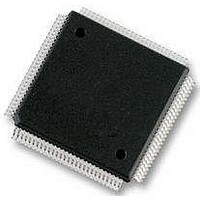MC912D60CCPVE Freescale Semiconductor, MC912D60CCPVE Datasheet - Page 311

MC912D60CCPVE
Manufacturer Part Number
MC912D60CCPVE
Description
IC MCU 16BIT 112-LQFP
Manufacturer
Freescale Semiconductor
Series
HC12r
Datasheet
1.MC912D60ACFUE8.pdf
(460 pages)
Specifications of MC912D60CCPVE
Core Processor
CPU12
Core Size
16-Bit
Speed
8MHz
Connectivity
CAN, MI Bus, SCI, SPI
Peripherals
POR, PWM, WDT
Number Of I /o
68
Program Memory Size
60KB (60K x 8)
Program Memory Type
FLASH
Eeprom Size
1K x 8
Ram Size
2K x 8
Voltage - Supply (vcc/vdd)
4.5 V ~ 5.5 V
Data Converters
A/D 16x8/10b
Oscillator Type
Internal
Operating Temperature
-40°C ~ 85°C
Package / Case
112-LQFP
Processor Series
HC912D
Core
HC12
Data Bus Width
16 bit
Data Ram Size
2 KB
Interface Type
CAN, SCI, SPI
Maximum Clock Frequency
8 MHz
Number Of Programmable I/os
86
Maximum Operating Temperature
+ 85 C
Mounting Style
SMD/SMT
3rd Party Development Tools
EWHCS12
Minimum Operating Temperature
- 40 C
On-chip Adc
10 bit, 8 Channel
Lead Free Status / RoHS Status
Lead free / RoHS Compliant
Available stocks
Company
Part Number
Manufacturer
Quantity
Price
Company:
Part Number:
MC912D60CCPVE
Manufacturer:
FREESCAL
Quantity:
203
Company:
Part Number:
MC912D60CCPVE
Manufacturer:
Freescale Semiconductor
Quantity:
10 000
- Current page: 311 of 460
- Download datasheet (5Mb)
MC68HC912D60A — Rev. 3.1
Freescale Semiconductor
cause of the receiver interrupt. When more than one hit occurs (two or
more filters match) the lower hit has priority.
A very flexible programmable generic identifier acceptance filter has
been introduced in order to reduce the CPU interrupt loading. The filter
is programmable to operate in four different modes:
•
•
•
•
Two identifier acceptance filters, each to be applied to a) the full
29 bits of the extended identifier and to the following bits of the
CAN frame: RTR, IDE, SRR or b) the 11 bits of the standard
identifier, the RTR and IDE bits of CAN 2.0A/B messages. This
mode implements two filters for a full length CAN 2.0B compliant
extended identifier.
bank (CIDAR0–3, CIDMR0–3) produces a filter 0 hit. Similarly, the
second filter bank (CIDAR4–7, CIDMR4–7) produces a filter 1 hit.
Four identifier acceptance filters, each to be applied to a) the 14
most significant bits of the extended identifier plus the SRR and
IDE bits of CAN 2.0B messages or b) the 11 bits of the standard
identifier, the RTR and IDE bits of CAN 2.0A/B mesages.
17-4
produces filter 0 and 1 hits. Similarly, the second filter bank
(CIDAR4–7, CIDMR4–7) produces filter 2 and 3 hits.
Eight identifier acceptance filters, each to be applied to the first 8
bits of the identifier. This mode implements eight independent
filters for the first 8 bits of a CAN 2.0A/B compliant standard
identifier or of a CAN 2.0B compliant extended identifier.
17-5
produces filter 0 to 3 hits. Similarly, the second filter bank
(CIDAR4–7, CIDMR4–7) produces filter 4 to 7 hits.
Closed filter. No CAN message will be copied into the foreground
buffer RxFG, and the RXF flag will never be set.
shows how the first 32-bit filter bank (CIDAR0–3, CIDMR0–3)
shows how the first 32-bit filter bank (CIDAR0–3, CIDMR0–3)
MSCAN Controller
Figure 17-3
shows how the first 32-bit filter
Identifier Acceptance Filter
MSCAN Controller
Technical Data
Figure
Figure
311
Related parts for MC912D60CCPVE
Image
Part Number
Description
Manufacturer
Datasheet
Request
R
Part Number:
Description:
Manufacturer:
Freescale Semiconductor, Inc
Datasheet:
Part Number:
Description:
Manufacturer:
Freescale Semiconductor, Inc
Datasheet:
Part Number:
Description:
Manufacturer:
Freescale Semiconductor, Inc
Datasheet:
Part Number:
Description:
Manufacturer:
Freescale Semiconductor, Inc
Datasheet:
Part Number:
Description:
Manufacturer:
Freescale Semiconductor, Inc
Datasheet:
Part Number:
Description:
Manufacturer:
Freescale Semiconductor, Inc
Datasheet:
Part Number:
Description:
Manufacturer:
Freescale Semiconductor, Inc
Datasheet:
Part Number:
Description:
Manufacturer:
Freescale Semiconductor, Inc
Datasheet:
Part Number:
Description:
Manufacturer:
Freescale Semiconductor, Inc
Datasheet:
Part Number:
Description:
Manufacturer:
Freescale Semiconductor, Inc
Datasheet:
Part Number:
Description:
Manufacturer:
Freescale Semiconductor, Inc
Datasheet:
Part Number:
Description:
Manufacturer:
Freescale Semiconductor, Inc
Datasheet:
Part Number:
Description:
Manufacturer:
Freescale Semiconductor, Inc
Datasheet:
Part Number:
Description:
Manufacturer:
Freescale Semiconductor, Inc
Datasheet:
Part Number:
Description:
Manufacturer:
Freescale Semiconductor, Inc
Datasheet:











